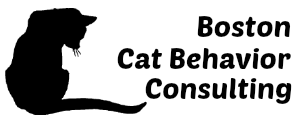We all know that we are not our best emotionally when we are not feeling well. We sometimes take it out on our loved ones. We’re irritable. We are less tolerant, we have a ‘short fuse’. Some of us just want and need to be left alone to recover. The same applies to animals. Cats (and dogs and birds and…) become irritable when they feel crappy too. Since they cannot tell us how they’re feeling, we must be keen observers for a change in attitude or habits or personality.
Rule Out Medical as the first approach to addressing cat behavior problems. This is my First Things First principle in cat and dog behavior consulting. There are always signs that symptoms of a disease are present before the diagnosis of diabetes, heart disease, kidney disease, and all kinds of cancer. This is why the vet tech always asks if you’ve noticed any coughing, sneezing, vomiting or changes in eating, drinking or litter box habits before your veterinarian performs the exam. Often it is in looking back that one realizes that there were behavioral signs before the diagnosis or, if not diagnosed, death.
It would be a shame to not know that your cat was actually sick and to let behavior signs and symptoms slide until you could not treat the disease or malady. But most of all, it is not fair to cats to let illness progress untreated. Veterinary medicine has advanced significantly and many even very serious diseases can be well-managed with medication so the cats can live long lives. A visit to your veterinarian is the very first thing you should do when you notice a change in your cat’s behavior.
